#Moral Failings
Explore tagged Tumblr posts
Text
NYC Jails Flagrantly Deny Young People’s Legal Right To Education
New Court Filings Say That the City is Violating an Eight-Year-Old Court Order Mandating Access to Education for People Under 22.
— Akela Lacy | April 4, 2024
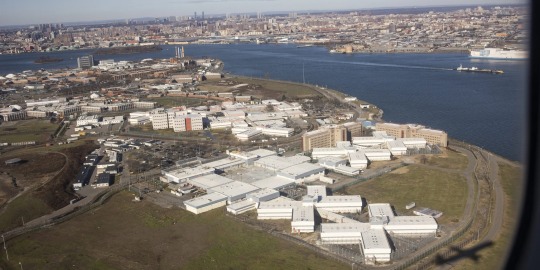
A View of the New York City Jails on Rikers Island, seen from a departing flight from LaGuardia Airport on Dec. 10, 2022, in Queens, N.Y. Photo: Andrew Lichtenstein/Corbis via Getty Images
Last June, New York City Mayor Eric Adams Spoke to Graduates at Rikers Island who received their high-school-equivalence diplomas while serving in jail.
“When you get your diplomas today,” Adams told the graduates, “I want you to stand up, lean back, be firm and strong and say, ‘I got this. When does the hard part start? I’m finished with the hard part. Now I’m moving forward to my destiny on what I want to accomplish.’”
The group represented the successful fruits of a law that guarantees access to education to people incarcerated in city jails. The success stories, however, are only part of the picture.
Other young people incarcerated in New York jails said in court filings that they’ve been repeatedly denied their legal right to education and that the city has failed to comply with a 2016 court order requiring education access for people between 18 and 21 held in in Department of Correction custody. In filings Wednesday, the plaintiffs in a decadeslong class-action suit against the city called for the appointment of a new court monitor to oversee implementation of the order.
“Not Only Is This A Legal Failing, But It’s A Moral Failing.”
“Not only is this a legal failing, but it’s a moral failing,” said Lauren Stephens-Davidowitz, a staff attorney with the Prisoners’ Rights Project at the Legal Aid Society, a public defense organization, which made the Wednesday filings. “You have these young people who are begging to get their high school education while they’re incarcerated, and are just trying so hard, and are being denied it.”
The original 1996 suit claimed that the city Department of Correction and the Department of Education failed to provide education to young people entitled to public schooling. Plaintiffs are now alleging that the city has failed to comply with a 2016 federal court order requiring that incarcerated young people be given access to a minimum of three hours of educational services each day. The order also required provision of special education services to people who needed them.
Class members include 29 people in New York City custody between the ages of 18 and 21 who don’t currently have a high school diploma. Declarations from class members provided to The Intercept document alleged violations of the 2016 court order, including claims that they’ve been told they can only receive education if they’re housed in certain programmatic facilities. (The Department of Education referred questions to the Department of Correction. The mayor’s office did not provide a comment.)
By keeping people from accessing legally required educational services, the Department of Correction is working against its professed goal of rehabilitation, said Stefen Short, a supervising attorney with the Prisoner’s Rights Project.
“It’s proven that when an individual attains their high school diploma or the equivalent in custody, their prospects for success improve on the outside,” Short said. “DOC is essentially letting folks sit idle rather than provide them with access to educational services to which they have a right. That renders everyone in the jail setting less safe. It’s a strange state of affairs. It doesn’t serve anyone’s interests.”
A spokesperson for the Department of Correction referred questions about the legal filing to the city’s Law Department, which represents the mayor and city agencies, and has not responded.
“The department has just received additional funding for programming for people in custody,” said the Correction spokesperson, Annais Morales, said, adding that the funds would allow for programs including general education diploma preparation and “tutoring for all people in custody.”
Last Chance For A Diploma
The court appointed a monitor in 2016 to oversee the city’s implementation of the order. In his third report in 2018, as his two-year term was winding down, the monitor found that the order was working for younger detainees, who were being phased out of the adult criminal system under a 2018 city law and were no longer part of the class, but not for people over the age of 18.
“While the education program at Rikers has shown marked improvements during the past two years, access to education for inmates age 18 to 21 is a persistent problem,” the report said.
Only people incarcerated in special Department of Correction program housing have access to education services. Detainees don’t have a choice in where they’re housed, and people in non-program housing have said they’ve requested access to education and been denied.
At a November meeting of the city’s Board of Correction, a nine-member oversight body, Correction Department Deputy Commissioner Francis Torres said the department provided educational services at only two facilities: the Robert N. Davoren Complex and the Rose M. Singer Center. “For this year, we have targeted our educational efforts, meaning granting access to educational services at RNDC and Rose M. Singer,” Torres said.
One incarcerated person, who needs special education services and submitted a declaration as part of the new filing Wednesday, said he had lost nearly a year of progress toward his diploma during the Covid-19 pandemic and was still being denied access to education.
“I need my special education services in order to make educational progress,” the incarcerated man said. “I am not getting the three hours of education per day that I am entitled to.”
The man, who said he was interested in vocational training in carpentry, computers, or cybersecurity, added, “I want to seize every opportunity I can to prepare for a better future.”
An incarcerated 19-year-old who received special education services prior to being in jail custody said Department of Correction staff told him he had to wait to receive education services until he was transferred to a different complex. When he got there, he said staff told him he couldn’t enroll in education services because he wasn’t in a school dorm.
“I was worried that I would not be safe in another housing area,” he said. “I did not think it was fair that I had to choose between school and safety.”
When an incarcerated person turns 22, they age out of the right to get education while in jail. “This is the last chance they have to get a high school education,” said Stephens-Davidowitz, the Legal Aid attorney. “This is a critical juncture in their lives. They have a right to do it, and they’re trying.”
#The Intercept#New York City#Education | Denial | Young People#Violation | Court Order#New Court Filing#New York City Mayor | Eric Adams#Rikers Island#Moral Failings#Last Chance | High School Diploma
0 notes
Text
A dream
It’s about moral entropy. It’s about being desperate to save the world, to do the right thing, and it’s about the slow dawning horror of realizing you’re being manipulated. Of everything you do only destroying the people you love. It’s about the inability to accept your own fall, clinging onto that pedestal of moral virtue even as it rots from the inside and inevitably crumbles. It’s about thwarting your younger, better self at every turn, dragging them back kicking and screaming as fate rips them into place and snapping at them to shut up because this is what’s good for you, good for everyone. And it’s about the realization that you were lying to the both of you.
There’s a strange feeling in you, when you look up the man who twisted your ideals and used you to set up the apocalypse. When you know finally you have no delusions left about exactly what he is, exactly what you are. You hate him, you love him, you hate yourself more.
And he speaks softly, kindly, and cruelly honestly. And he tells you that you’re a rabbit struggling, ensnared. That you could still rip away free, gouges deep in your flesh, but you don’t have to take this last step. But the little rabbit sees the prize on the other end, and so they struggle in further and deeper and allow themselves to die.
And he offers you three items, and you know at once this is your final mission. And he is honest when he says it will destroy you.
(And it’s not about the objects, was never about the objects, not the rotten apple in his hands nor the rusted keys nor the bent spoon, it was all about what he would do with them, or rather what you would do to yourself with them)
Because then he offers one last item. And he says this will be the start of your recovery. That you will heal from even this, even if no one else will. He says that you will survive no matter if survival sounds worse than the Hell you deserve. That one day, despite it all, the trauma will begin to knit itself closed.
And you ask for a moment to decide. And he grants it, kindly. And you just fall to your knees weeping, knowing this is all your fault. Knowing how deeply you betrayed everyone, betrayed yourself. Because this? This destruction? This unbecoming of all things? You guided it every step of the process beneath his hand. This is nothing like the world your younger, better self fought for, so far from good and righteous that you don’t even know who you are anymore.
And I hear this line, so crisp and solid and tangible. A solid epiphany in the midst of the dream self’s despair: No wonder my mother flinches from me every time I reach for her.
But you take one last shuddering you, and wipe your tears and get up. And you accept the items because it’s so, so far past too late. And so you destroy the world.
#I woke up like ay bro dream self get some therapy#I could explain dream plots about time travel and destroying your own past for the mistaken belief it will save the world#But honestly the vibes were the best part#I am plagued with visions#Dream#nightmare#dreams#dream journal#short story#second person pov#cause that’s just the pov that makes sense for dreams to me#Villain arc#i guess?#undeserved redemption#Moral failings#Idk the dream hit hard and I’m still reeling the vibes were so good#something to nom on
1 note
·
View note
Text




tarpit site.
#personal#delete later#for context a tweet i made in the middle of the night blew the fuck up and brought the attention of anime fans who've been#harassing and hassling me about my big factual blunder for an entire day straight#“ok i'll apologize” “bro it's not that serious.”#“you're right it's not that serious“ ”why won't you just admit that you're wrong and apologize!“#i'm not going crazy right. i feel like i'm getting manipulated into thinking i must've been wrong#it's crazy how twitter hate will trick you into believing saying something someone else disagrees with is a moral failing#sorry i haven't seen frieren i guess but what's it to you. i wasn't making a claim or statement#also because nobody has gotten this in the original post i wasn't talking about the quality of animation i'm talking about solid drawing#which is a very specific principle of animation. dandandan has really good solid drawing wherein all the characters are animated#with realistic and proportional 3d depth. newsflash but trigger doesn't prioritize solid drawing in their animation and that's fine#it's an aesthetic choice and has ties to production limits. none of this is a big deal. this is all so stupid lol#i've dealt with worse and more annoying weebs though it's fine i'll put on my clown nose twitter needs their stupid guy for the day#oh btw at the end of the day this doesn't matter. it'll be over by tomorrow. all that's happening is petty angry emotions.#so please don't involve yourself by jumping into the argument and prolonging this shit#i'm about to go on a date with tulli after being apart for a month this is the furtherest thing from my mind rn
1K notes
·
View notes
Text
Let us be brutally honest with ourselves and with eachother for a moment. If he weren't obese you motherfuckers would be capable of percieving evrart claires sexy sexy moral ambiguity and complex charms
#i am (lesbian) sipping him like a fine DESSERT WINE#my evidence by the way is very simple and very damning. joyce messier. there i said it.#if you guys can appreciate the fact that Joyce is a complex figure worthy of disgust yes but also worthy of empathy#despite being a venal coward facilitating acts of violence and slaughter of the organized working poor of martinaise in the name of capital#if you can understand that she is a dimensional figure while also being an embodiment of the moral apathy and cruelty if capital owners#but you cant look at evrart and see that he is (while deeply flawed and morally suspect) also a dimensional figure#on top of the fact that his motivations are eminently relatable and dare i say it baser#and his greatest failing imho is in failing to advocate for the interests of *all* the poor of martinaise#opting instead to marginalize the inhabitants of the fishing village in favor of a power grab in the interests of himself and his union#though this is imo a bit of a grey area morally. undeniably a wrong and bad thing to do but done in service of clairs political goals#to gather power to advocate for the working class against ultraliberal monoliths like wild pines and fascistic orgs like krenel#still super wrong but i can follow the moral arithmetic there tho i don't like it#but like my point is if u can see that joyce is evil and pathetic but still cool and sexy but you consider clair flatly distasteful#thats cus hes not conventionally attractive#cus he is *every bit* as dimensional and interesting as joyce and he is not nearly as politically shite even if hes interpersonally a jerk
2K notes
·
View notes
Text
i need daniel to be overcompensating for his insecurities so bad. 100 times more cocky and rude and aggressive and insensitive than he was as a human, falling back into old dangerous habits and vices, not just because now he has new energy and power and wealth to flaunt but because it's ALL he has, and he needs to cling onto it. play it up and revel in it so no one sees that underneath, he feels like a botched fledgling in the body of a sick, faded old man who maybe has no real idea why he was even made. that armand might think he failed in making him. that his maker didn't even really want him.





#i think vampirism isnt inherently torturous to him in any sort of moral way#but more in an inner self worth/image way#louis felt he was failing because he rejected/didn't enjoy human blood and death#i can see daniel being fine with killing but being insecure about the way he turned out/the way he is now#and his complicated connection with armand and what it all means for him. why he cares what he thinks or feels when he doesnt want to#but he does. and he has all these questions he needs him to answer#this sort of thing would be a way to connect him to louis further and also lestat now#louis who felt like a “botched vampire” for a long time and lestat who was immediately abandoned by his maker#and how lestat coped with what had been done to him by trying to fully embrace what he'd been turned into#anyway the bottom line is i think he should suffer and struggle with vampirism just as much as everyone else has in his own way#but he still has to be a massive insufferable asshole about it. and maybe get smacked around a bit because of it#iwtv#daniel molloy
808 notes
·
View notes
Text
"Red white and royal blue is too cringy" "heartstopper is too unrealistic" yeah maybe but so is every single other rom com under the sun. Why does queer media always need to be realistic and profound while straight stories get more freedom to be silly and fantastical?
#red white and royal blue#heartstopper#lgbtq#being cringy and unrealistic is just like#a staple of the rom com genre lol#as more queer stories are being highlighted#not everything is going to appeal to everyone#and that shouldnt been seen as some kind of moral failing#birdy chirps
8K notes
·
View notes
Text

#thanksgiving#holidays#fuck diet culture#ed recovery#self and others#kindness#body image#body positivity#body neutrality#body acceptance#your body is not a moral failing#food isn't good or bad it just is what it is#mental health
450 notes
·
View notes
Text
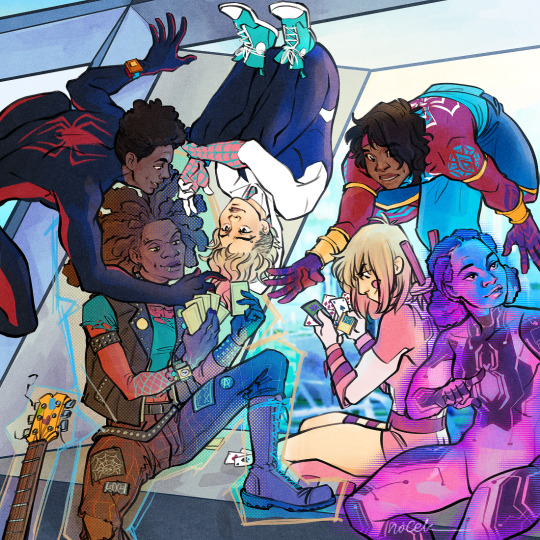
it's meant as a first panel in comic but you know what, with amount of work (to figure out how to do "special effects" on Hobie and Margo as efficiently as possible) I poured into it it deserves separate post ;P
oh and if somebody is interested sketch version is here actually I'm quite proud it only took 4 days to finish, felt much longer >.<
#spiderverse#across the spiderverse#miles morales#gwen stacy#pavitr prabhakar#margo kess#gwen poole#hobie brown#spiderman#spider gwen#ghost spider#spider punk#gwenpool#spider byte#spiderlings#i love them to bits#but damn#that was a lot to draw even if i was trying and failing to do it as sketchy as possible
2K notes
·
View notes
Text
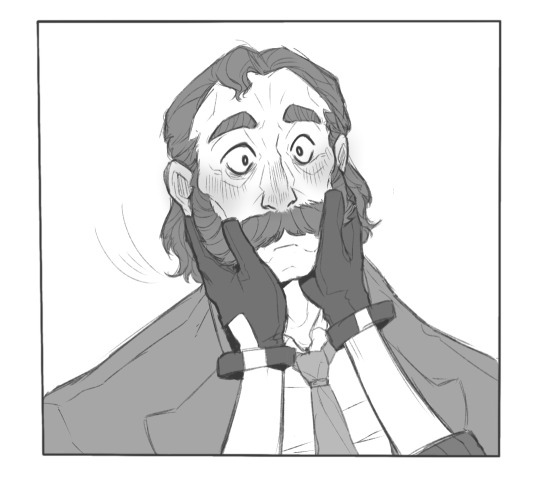
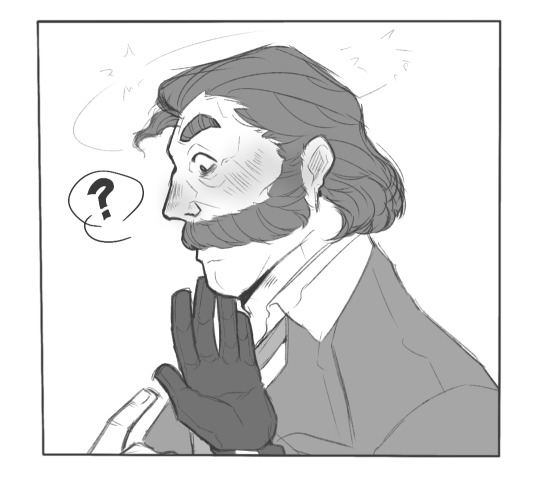
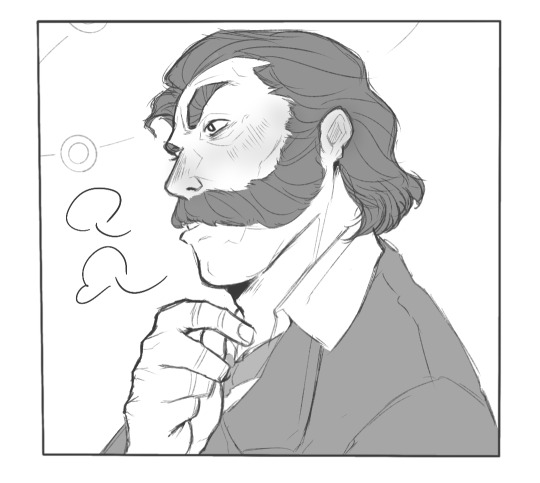
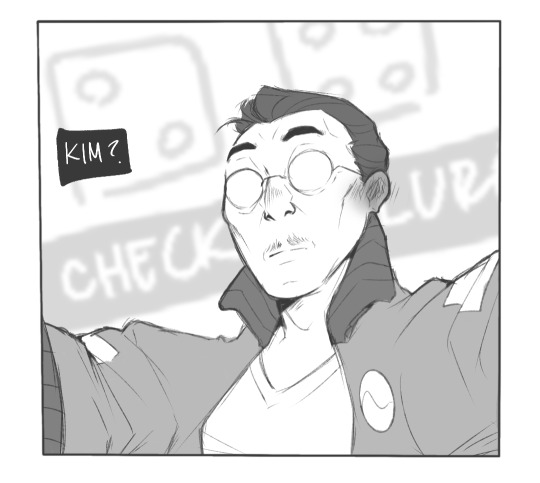
Kim got like 2 points in Physical Touch
#he fails the check but harry kisses him on the forehead#something something healed morale damaged health#yes i support the 'only kim's ears blush red' agenda#harry du bois#kim kitsuragi#tequila sunrise#disco elysium#disco elysium fanart#artists on tumblr#fanart#de#kimharry
3K notes
·
View notes
Text

04 x 16 | Just stay with me 🧣
#someone shoot me in the head please#they make me so sad#This episode really encapsulates the moral of the story House MD was trying to tell#that is that you can do everything right and you might still fail#the randomness of reality...#all you can hope to do is try your best#house md#malpractice md#hatecrimes md#house md season 4#gregory house#greg house#doctor house#amber volakis#house md fanart
490 notes
·
View notes
Text

the siblings
#i'm so sorry for the lack of kiddos 😞 a moral failing on my part#also this is a moment from grains recent vid if ur wondering#grian fanart#pearlescentmoon fanart#hermitcraft fanart#hermitcraft s10#digital art#my art#kiddo au
554 notes
·
View notes
Text
"if shermie is the baby in A Tale Of Two Stans then according to The Rest of the timeline he would've been a teen parent, and then dipper and mabel's parents would've been also, which would be kinda fucked up" I mean yeah alright. my mom had my brother when she was 17 and his dad was 16. I'm not saying it's a Great or even a particularly good thing but it does happen. the pines family is already so fucked up let's just add teen pregnancies to the mix. dipper and mabel's parents are getting divorced like canonically. their divorce is what kicks off the show
#words from the monarch#shermie being An Older Brother and the baby is his kid is interesting also and From Hwat Ive Heard is what alex is leaning towards now#ANYWAY THIS IS NOT TO SAY teen pregnancy is a personal moral failing or anything. im just really not sure A Teenager is truly ready for tha#im older now than my mom was when she had my brother. i think abt that. i could never be ready for that. but she had to be. bc it happened.#she became a mother before she was legally allowed to drink.#IM OLDER NOW THAN SHE WAS WHEN SHE HAD ME. I JUST REALIZED TGAT ALSO. JESUS CHRIST.#gravity falls#sorry is this tmi. i saw a video on gravity falls' timeline and was thinking#ask to tag
333 notes
·
View notes
Text



I figured this would be appropriate....
#vincent price#the comedy of terrors#comedy of terrors#funny#is there no morality#i can assure you sir...there is NO morality left#this country failed vincent#but hes beautiful#and makes me happy#so all is not lost#bicon#classic horror#horror#old horror movies#vintage#movie#actor#handsome#gif#gifs made by me
286 notes
·
View notes
Text
I know Heimerdinger's Christian Linke's favorite character, and I sort of tolerated it in s1, but now it feels like things are a little too indulgent. Heimerdinger gets to team up with Ekko to launder his reputation through Ekko and the Firelights. Heimerdinger gets the first narrative game and second character teaser in the promotional cycl. Heimerdinger gets to SING A SONG that's included on the s2 Arcane soundtrack (Spin the Wheel).
Maybe I'd be less annoyed if the show at least did more to acknowledge Heimerdinger's failings as a leader, but his character description can't even do that. This is how the official Arcane website describes Heimerdinger:
"Heimerdinger warned the Piltover Council about the dangers of using magic without tangible solutions for safeguarding its use. Learning from his mistakes with Jayce, Heimerdinger inspires Ekko to keep looking for a solution and works with him to solve the problem, instead of just offering advice."
That's not Heimerdinger's main problem! The problem is the fact he's the person most singularly responsible for the state of Zaun and Piltover. It feels like the show and the cast are just dancing around the fact that Heimerdinger technically has the highest body count in the show (Day of Ash, pollution, extreme poverty, etc). The one time someone puts him to task (Jayce), the show makes it seem like Jayce is wrong or overstepped, and yeah he did do it for Viktor's sake, but Jayce was right! Heimerdinger's bad at his job, he shouldn't be in a leadership position if he's a bad leader.
#arcane#arcane ramble#heimerdinger#they probably didn't include heimer in the scene where the council gives the greenlight for enforcers#to shakedown zaun#but inaction is still a choice it's still a failing politically and morally#it still makes him look bad and i don't know if the showrunners really get WHY#that's why the decision to have Ekko be paired with Heimerdinger is so baffling#it ignores the weight of the Heimerdinger's impact as a leader and is frankly a disservice to Ekko's character#and really any character from zaun or even piltover that cannot take the 2 nanoseconds it requires to recognize how heimerdinger failed them#and the explanation that ekko respects heimerdinger as an inventor and they connect as such is kind of ridiculous#does that mean if silco had an engineering degree suddenly he and ekko could be bffs?#alright I've said my piece about this oversized troll doll#maybe I'll say more after s2#almost definitely#also I'll always be on Jayce's side for kicking heimerdinger out#he was objectively rught that heimerdinger shouldn't be there#Heimerdinger's still president of the Academy he's just not council member#why work in policy if you're uniterested politics?
294 notes
·
View notes
Text
the way this website treats disabled people is actually horrendous
#yes even the ''progressive'' types always love to imply that literal symptoms of disability#means someone is lazy or that its a moral failing or that they should simply just stop#and the sheer NUMBER of autistic people shitting on other autistic people with higher support needs than them#or who ''act'' more autistic or just have more unpalatable inconvenient or annoying symptoms than them#that cannot be treated like just a quirky trait that makes them more interesting or cute or whatever#i think i wrote like. 2 posts on that where its more coherent than here idk#''this is the autism website'' no. i don't think i feel very welcome here.#mine#yomipost#ableism#actually autistic#i guess other people can add on if they want cause im not gonna be able to articulate much else than that
264 notes
·
View notes
Text
When its 3am but the grumpy morally grey character had a 'oh, oh' moment as they stare at the sunshine character all while trying not to have a panic attack.
#this prompt never fails to make me#giggling and kicking my legs#blushing#grumpy x sunshine#enemies to friends to lovers#enemies to lovers#grumpy and sunshine#morally grey characters#sunshine character#jegulus#the love hypothesis#adam carlsen#and wolfstar#wolfstar#james potter x regulus black#james fleamont potter#regulus x james#james potter#fanfic rec#remus lupin#james and regulus#remus x sirius#sirius black#marauder era#nobleflower#sunseeker#starchaser#quillkiller#evan and barty#dorlene
1K notes
·
View notes